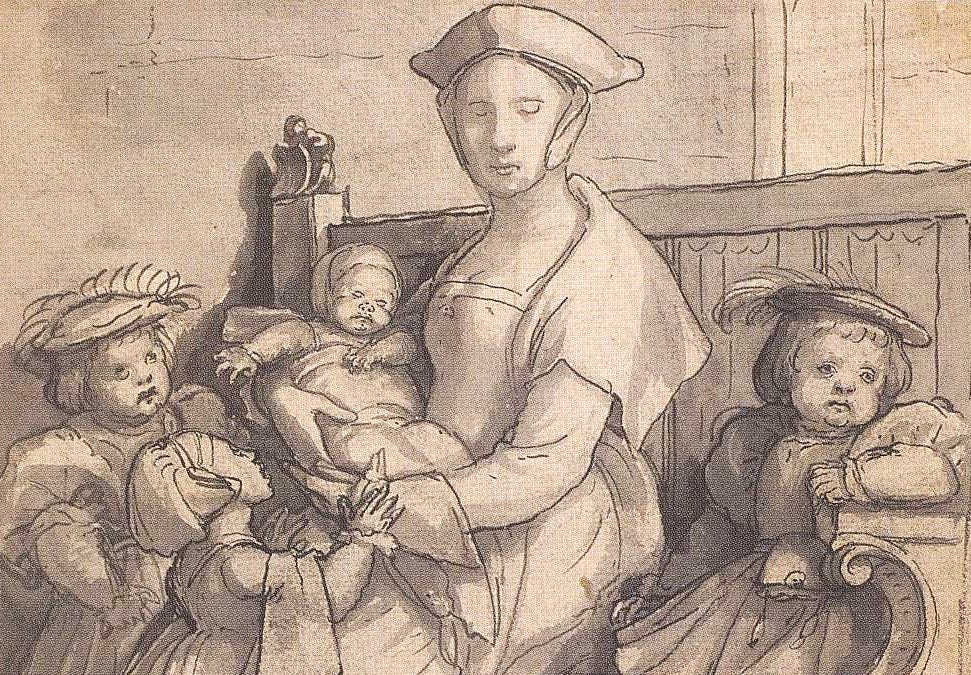When, in 1609, John Donne wrote A Litany, whose fifteenth stanza is our Poem of the Week, he was laid up with neuritis, with racking pains in his muscles and his mouth, and he did not believe he would rise again from his sickbed. He did, though; he would live another twenty-two years. He wasn’t yet an ordained priest, but he had given up his early raffish ways, and was happily married to Anne More, whom he dearly loved. I’m mentioning it because they got married in secret, and Anne’s father was outraged. It landed Donne in prison for a while, derailing a promising career in the courts of Queen Elizabeth and then King James. “John Donne, Anne Donne, Un-done,” was the note he dashed off to his new bride.
It wasn’t always going to be that way, but the Donnes were poor for a long time. John Donne loved his children as much as any man ever did, and even though losing a child was common enough in those days, when it happened the first time he was all but crushed. He didn’t even have the money for the burial. (The Donnes had twelve children; seven survived to adulthood.) Finally, in the very year in which he wrote “A Litany,” old Mr. More decided to forgive his son-in-law, and handed over Anne’s dowry. The poet recovered from his illness, and he was taken back into favor at court, so that he and Anne did enjoy the rest of their married life free of poverty and the fear of its return. But if we go back to that critical year of 1609, we can see the poet struggling with fortune good and bad, with placing too much hope in the things of the world, and also with despairing of the world and scorning the goods that it does offer, and that are ours to seek, so long as we don’t make them into our governors or false gods.
Now then, a “litany” is a ritual prayer, recited alone or by a congregation, and Donne’s is constructed with remarkable precision. It includes 28 stanzas, each of 9 lines, with a specific metrical pattern: 4-5-4-5-4-3-5-5-5. Donne chose 28 deliberately; it’s a so-called “perfect number,” as it’s the sum of all its factors (1 + 2 + 4 + 7 + 14 = 28; the next one after 28 is 496). The first 4 stanzas of the litany appeal to the Father, the Son, the Holy Ghost, the Trinity, and in the next 10, Donne begs the prayers of, and considers the examples of, Mary, the angels, the patriarchs, the prophets, and so forth, on to the whole choir of the church triumphant. That brings us to the second set of 14, whose first stanza is what follows. These stanzas are deeply personal, praying in various ways for God’s grace, to endow the poet with the right spiritual frame of mind, the right approach both to the world that is passing away, and to the everlasting world to come.
Donne prays to be delivered from being anxious (the word suggests constriction and cramps), and from being “secure,” in the sense of “careless,” heedless. Certainly, Donne was by temperament an anxious man, not happy-go-lucky. We aren’t all blessed with a sunny disposition, and that’s all right. But he also prays to be delivered from being “secure,” and that calls for a little explanation. I think we’ve all met people who do the merry whistling through life, not giving a thought to God, or they say to themselves, “God’s going to save me no matter what I do,” as if they had the Most High wrapped round their finger. There are gloomy people who behave as if the world were bad, or who seem to think that you can’t be seeking God if you also seek some of the good things this life has to offer. Then there are people who behave as if the only good things to seek are what you might find at court, or what you might get with a nice job, and so forth. Both are wrong, says Donne. God is generous of his good, and he loves us; he loves us enough meet our needs in this life to promise to us the greatest good of all, eternal life with him. That’s why Donne appealed to the Trinity in the first place! From all wrong thoughts about this world, then, both those of lumpish gloom and those of folly, good Lord, deliver us.
From being anxious, or secure, Dead clods of sadness, or light squibs of mirth, From thinking that great courts immure All, or no happiness, or that this earth Is only for our prison framed, Or that thou art covetous To them whom thou lovest, or that they are maimed From reaching this world's sweet, who seek thee thus With all their might, Good Lord deliver us.
Word & Song by Anthony Esolen is an online magazine devoted to reclaiming the good, the beautiful, and the true. We publish six essays each week, on words, classic hymn, poems, films, and popular songs, as well a weekly podcast, alternately Poetry Aloud or Anthony Esolen Speaks. To support this project, please join us as a free or paid subscriber. Learn more about our subscription tiers by clicking the button below.













Share this post